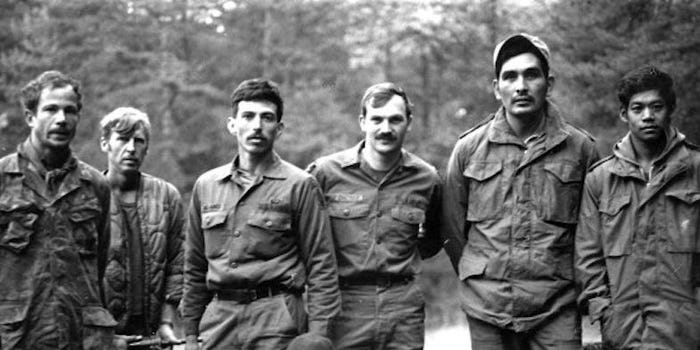Although SEAL Team Six recruits from across the Navy for its various support and enabler positions, it only screens SEALs and Special Warfare Combatant-Craft Crewmen (SWCC) for its assault squadrons.
For example, a Navy explosive ordinance disposal (EOD) technician or a cryptologist could serve on SEAL Team Six in a support role and go out on target, but they wouldn’t go through the physically and technically arduous Green Team.
“The [Delta] cadre are very professional. They’re following a script. This isn’t your Basic Underwater Demolition/SEAL (BUD/S) or Ranger Assessment and Selection Process (RASP). There is no yelling, no shouting. That alone is enough to unsettle seasoned guys who are used to an ‘in-your-face’ approach during Selections,” the former Delta Force operator added.
A Hard Course
Assessment and Selection takes place in the mountains of West Virginia and lasts for about a month. Delta Force Selection is divided into three phases.
In the first phase, the cadre, which consists of Delta Force operators overseeing the process, get the candidates acquainted with the course and administer basic physical training, administrative tests, evaluations, and land-navigation instruction.
During this phase, candidates complete individual ruck marches and instructor-led ruck marches, during which Delta Force operators will set the pace, and candidates have to keep up or quit.
In the next phase, called the “Stress Phase,” candidates don’t get to return to barracks after each day. Instead, they remain on the field, and every morning they get a set of coordinates for a location that they have to find with just a compass, map, and their wits.
Although the points might be a few miles apart, the West Virginia terrain requires candidates to cover far more than the map distance between points. The candidates average between 12 to 18 miles a day throughout the course, with several 20-miles plus ruck-marches.
Candidates aren’t allowed to communicate with each other at any time. Cadre continuously stress that Selection is an individual effort. The few that make it this far face the longest ruck-march yet.
Selection’s final event is the “Long Walk,” in which candidates have to finish a timed 40-mile ruck-march. By this point, candidates are already physically destroyed, having covered hundreds of miles during the previous weeks.
The survivors then go through the commander’s board, where the Delta Force commander and his ranking men grill each candidate individually to determine if he is a good fit for the Unit.
Addition by Attrition
Selection often produces some hilarious stories. When a Selection course starts, locals are usually briefed so they won’t be surprised if they see random men in fatigues with huge rucksacks roaming through their fields.
“When I realized I was lost on day four I knocked on a hillbilly’s door and asked him for help. He sat with me and we looked over my maps carefully. After a brief while, he finally slapped his knee, claiming he could get me where I needed to go. He drove fast and left me in a cloud of dust. When the dust settled, I could see that I was in the exact same spot I was when I first realized I was lost. They know not to help candidates,” Hand told Insider.
For those who do manage to pass the commander’s board, the journey has just begun.
Following Selection, there is the Operator Training Course (OTC), a six-month course that teaches prospective operators the dark arts of close-quarters battle and close target reconnaissance, as well as other skills like military free-fall parachuting and offensive driving.
Those unfortunate enough to finish Selection but not pass the commander’s board return to their units with a certificate for finishing an advanced land-navigation course.
“My class of Delta Selection had the highest graduation number in history to date,” with 29 members, Hand said.
“The attrition was 87.5 percent. Most classes run in 90s percentile [sic] attrition. A graduation of just two men was not unheard of, and there is even a class graduation of a single man, Ray P., the Million Dollar Man,” Hand told Insider.
Hand has written one of the few accurate accounts of life inside Delta Force. Brothers of the Cloth describes Hand’s time in Delta, with operations from Mogadishu to the Balkans, and includes stories from legendary Delta Force operators.
This article was written by Stavros Atlamazoglou and originally published on the Insider.










COMMENTS